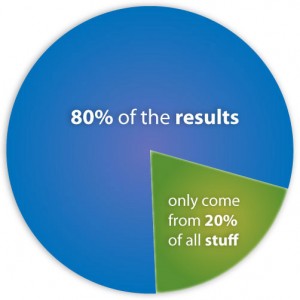I read an interview with Michael Jensen, Emeritus of Harvard Business School entitled, “Integrity: Without It, Nothing Works,” a bold title, that peaked my interest. He really made me see that if I got in sync with the “Law of Integrity,” I could tackle those areas in my life — where I feel stuck — with greater ease. I could create workability where it is lacking and increase my productivity and performance tenfold just with a little practice.
Before I read the interview, the word integrity, made me think of “integrity” as a virtue; it is good to have integrity and it’s bad not to. The article helped me see that being caught up in the good / bad, right / wrong characteristics of integrity hides its relationship to workability and performance. Jensen makes the case that “as integrity declines, workability declines, and when workability declines the opportunity for performance declines” as well. He calls it the Law of Integrity.
Think of the spokes on a bicycle. If I remove spokes from the wheel, the integrity of the bike is increasingly diminished with each spoke I remove. As the integrity is more and more dimished, the wheel becomes less and less workable: its performance is ultimately compromised.
Jensen gives an example of how things that lack integrity affect our lives. Think of your car. When you don’t manage its maintenance, parts of the car can begin to wear out, run less efficiently, or break. The car becomes unreliable which makes you late for work, late for meetings, maybe even late to pick up your child at school. The “out-of-integrity” of your car creates a lack of integrity in your life that produces all kinds of fallout. Over time, you begin to show up as unpredictable, unreliable and untrustworthy, to your work associates, family members, and yourself.
The effects of the “out-in-integrity” behavior in our lives mostly go misidentified, unnoticed, and unacknowledged by us and others. We could simply say, the issue is with the car. However, if we look at integrity as defined in the article as “a state or condition of being whole, complete, unbroken, unimpaired, sound and in perfect condition,” then the condition of my car directly provides “actionable access” that leads to opportunities for workability that enhance my ability to perform in life. With this model of integrity, the breakdown with my car illuminates the pathway or actionable steps I can take to create, maintain and restore integrity. This, in turn, gives me direct access to maximum performance in all areas of my life.
Fundamental to the Law of Integrity is honoring your word with yourself and others. More specifically, it means:
If we faithfully manage our integrity with ourselves, with the groups we are involved with, and the organizations that are important to us, Jensen explains, over time, “it enriches the quality of one’s life.” Effectiveness, workability, and increased performance are all a by-product of this model of integrity. He says, “People fail to link the difficulties in their lives or in their organizations to out-of-integrity behavior. The increases in performance that are possible by focusing on integrity are huge.” In his own company, after three years of implementing this Law of Integrity, Jensen saw a “300% increase in output, with essentially no increase in inputs.”
Michael Jensen makes a convincing case for integrity’s critical link to performance. Think about areas in our lives that don’t work (our homes, our work environments, our healthcare system, the financial industry, our political system). What would be possible if we, as individuals, in our society took on the “Law of Integrity” in those areas where we feel stuck, life feels unworkable and productivity needs a boost!
Wow, that would create a new future for all of us!
Click on the title above to learn more about the featured author.
 “How can I make my parents organize their papers? They gave me power of attorney and named me as executor, but I don’t know where anything is.” I receive phone calls like this several times each year. The caller is usually fearful, frustrated, and worried about the state of the parents’ affairs.
“How can I make my parents organize their papers? They gave me power of attorney and named me as executor, but I don’t know where anything is.” I receive phone calls like this several times each year. The caller is usually fearful, frustrated, and worried about the state of the parents’ affairs.
Each time I hear this question, or one like it, I’m reminded of the old lightbulb joke:
Q: How many psychologists does it take to change a lightbulb?
A: Only one, but the lightbulb has to want to change.
The same is true for a disorganized loved one – they have to want to change their situation. But even though we can’t make them change, there are a few things we can do to pave the way for them to request help.
First, a few things to remember:
In short, your parents likely feel some level of embarrassment or vulnerability. To be successful, you will need to be sensitive to their discomfort, and respect their pace. Here is the sequence I recommend to clients who are preparing to assume their parents’ affairs:
It might take a few iterations to build some momentum with your parent. The key is to respect your parent’s preferred pace. In time, your parent may trust you enough to delegate work to you, or let you hire a professional organizer.
Click on the title above to learn more about the featured author.
 Ever heard of the 80/20 rule? An Italian economist, Vilfredo Pareto, first talked about it roughly 100 years ago, when he observed that 80% of Italy’s wealth was in the hands of 20% of the population. Since then, the “Pareto Principle” has been found to have widespread applicability: in most situations, 80% of the benefits come from 20% of the causes.
Ever heard of the 80/20 rule? An Italian economist, Vilfredo Pareto, first talked about it roughly 100 years ago, when he observed that 80% of Italy’s wealth was in the hands of 20% of the population. Since then, the “Pareto Principle” has been found to have widespread applicability: in most situations, 80% of the benefits come from 20% of the causes.
There are many everyday examples of the 80/20 Rule.
The Pareto Principle is enlightening to me when I apply it to my clients’ complicated relationship with paper.
I think Pareto was onto something here. Could it be that in any stack of ten papers, roughly two of them are truly valuable? Could we train ourselves to zero in on those vital two and let the other eight go without agony or regret? What do you think?
Still struggling? Professional organizers are compassionate helpers skilled at guiding their clients to zero in on that valuable 20% worth keeping, whether it’s paper, household clutter, or excessive time commitments. Use the Find An Organizer feature on this web site to locate an organizer near you.
Click on the title above to learn more about the featured author.
January is National Get Organized Month and it’s also the time for making resolutions and promising to follow through on all the advice in the self-help books on your bookshelves. Being the author of a self-help book, I can’t say I don’t recommend them, but striving to constantly improve your life and your home may not be the best advice.
According to Lindsay Myers on brainblogger.com, self-improvement represents a $10 billion per year industry in the U.S. alone. (In addition to high revenues, self-help has a high recidivism rate, which means that those same people already purchased another self-help book in the last 18 months.) Whether we want to lose weight, eat healthy, have a better marriage, or advance in our career, many of us rely on self-help books to improve our lives.
What’s more, home improvement is an almost $300 billion industry, which some say started with Bob Vila on This Old House and cable channels taking over from there with HGTV and DIY Network. I must admit that we bought our old farm house over 30 years ago and we’ve been improving and upgrading ever since.
Stop Improving Yourself and Start Living by Robert Jean Bryant is a classic self-help book that challenges us to end the perpetual quest for improvement and instead upgrade the quality of our daily lives. We are constantly bombarded by commercials and retailers who try to convince us to buy the latest and greatest stuff so we can “improve” our lives. But all that buying means more clutter, distracts us from the real issues and the real people in our lives, and takes us away from living in the moment. Bryant also says that when you get off the treadmill of constant improvement you help yourself to the freedom of creativity, joy and well-being.
I suggest that we start 2016 by getting back to the basics. Let’s break it down:
Finally, answer the question “I wish I had more time to…” and make it happen. As the saying goes, life is not a dress rehearsal.
Clutter Quote: “Know many, trust few, learn to paddle your own canoe.” Anonymous
 While visiting Italy I learned the maxim, Americans Live to Work, while Italians Work to Live. Their work day seemed a little longer, but the pace appeared less frenetic. They started a little later but enjoyed leisurely lunches and animated banter with coworkers.
While visiting Italy I learned the maxim, Americans Live to Work, while Italians Work to Live. Their work day seemed a little longer, but the pace appeared less frenetic. They started a little later but enjoyed leisurely lunches and animated banter with coworkers.
Sitting in cafes observing the Italian lifestyle was as interesting as taking in their architecture. They appeared to savor the moment, dining alfresco, without waiting for the weekend to jam chores and fun into forty-eight hours. I admired this philosophy and tried to integrate it into my life upon return.
I became more aware of certain turns of phrase here in the States. Sentences such as, “I have to Chair the fundraiser again this year,” now had a different ring to them. When someone said, “I have so many events and obligations, but I can’t eliminate any of them,” it somehow sounded different.
Many of us approach work with the same mentality. Is there something about our culture that equates being busy with a badge on honor? Are we concerned about appearing lazy if our schedules are less than hectic? I’ll admit to needing to learn to say no. It’s not easy.
How does this relate back to time management? Simply stated, the way we use our time can often be a manifestation of our beliefs.
If we believe that anything less than busy is unambitious, our calendars will be filled accordingly. If we want a life that reflects our goals and dreams, decisions should be made mindfully before the calendar fills up.
In terms of time management, often the goal is to try to fit more tasks into our life. I lean toward minimalism in my organizing practice, and I believe the same minimizing principals can help us with time management. Yes, we need to plan work, meetings, errands, and time with friends and family. The idea here is to step back and do all this mindfully. Start with your goals or the goals of your family. We can work and give back, but we can do so joyfully. Here are some points to remember:
Business and pleasure don’t need to be separate. As long as you conduct yourself with appropriate decorum, work can be fun too. Live in the moment. Strive to be present. It certainly seems to work in Italy.
Trying to know everything about the Internet is as impossible as reading every book ever written. Like the spooky spider webs (real and synthetic) that accent our autumn décor, the fingers of the world-wide-web stretch and reach into sometimes unexpected corners of our lives. Schools, grocery stores, medical offices, places of employment and social groups – it is hard to find areas of life that are not touched. Yet, while technology races to manage our world, how well are we managing technology?
No matter where you find yourself in this digital age — ahead of the curve, just keeping up, or lagging behind — step away from the shivers you feel about getting caught in the web. Here are suggestions of some free tools and applications that I, myself, have found useful. They have helped me create order and ease in different areas of my daily life.
When You Shop: If you keep your cell phone with you, use it to store your shopping lists. Simply take a picture of your refrigerator grocery list before leaving the house or have a family member text you a picture of it when you’re at the grocery store. Create your list in an “app” such as Remember The Milk. And toss all those plastic loyalty and club cards. Use an app called Key Ring and they will always be with you when you need them.
Appointment Management: Phone calendars are wonderful for helping keep track of appointments and deadlines. They even offer the ability to set alarms. Go a step further and set up a shared calendar for your family in Google so you can know who needs to be where and when.
Travel Help: Have you ever been traveling and needed to find a gas station, restaurant or restroom? Don’t want to end up in a less than desirable location? Use the Yelp app to find something local and reviewed by others. Want to catch a movie on the fly? Try the Flixster app to find what’s playing now in your current location.
Files at Your Fingertips: Whether used for business or not, this can be more handy than you might think. Try creating a medical file in Evernote or Dropbox with snapshots of test results, medications and procedures. Bring an iPad or tablet to your doctor appointments and pull them up so your doctors can scroll through them easily. Similarly agendas, contact lists, and meeting notes for your association or social club meetings can be saved online. Even if you prefer bringing printed copies, storing them in Google Drive is a great backup plan. If you get into a bind and are caught without the printouts, you can log in to your Google account and access the notes on your phone or tablet without having to stop home.
I challenge you to choose one new techno-solution this month and see if it can help you streamline an aspect of your life. Don’t wriggle helplessly in a web constructed by someone else. Use technology to create your own web of control and order. Replace your fear of the Internet by spinning a web of your own design.